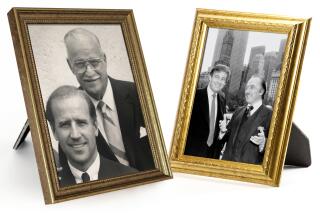Fathers, Sons and the Lessons of War
- Share via
I never served in the military. Before my son unexpectedly volunteered for the Marines, I was busy writing my novels and raising my family, and giving little thought to the men and women who guard us. My attitude has changed. I did not choose to change. I was forced to.
When my son was at war in Iraq I felt anger toward my circle of oldest friends -- mostly well-off, well-educated people. I didn’t know one other parent with a son or daughter in harm’s way or even in the military. And no leaders were asking Americans outside the military to make any sacrifices. Were we all in this together or not?
My son, Marine Sgt. John Schaeffer, recently came home alive from two back-to-back combat tours in the Middle East.
A tall, thin figure slowly unfolded from a beat-up little car. John had driven all night to Boston from a base near Washington, where he had landed the day before. He did not want me to meet him there. “I’ll need time to myself,” my son said when he called from Kuwait on the way home. He said he wanted “to get my head in gear.”
I gave my wife, Genie, a head start. Mother embraced son. “I was so worried,” Genie said. John held her as she sobbed. She pulled away to look up again and again to make sure he was really there.
My wife gave me a great gift: time alone with my boy. John was bone-weary and lay stretched on his bed. I lay down next to him and was gripping him the whole time, an arm, a hand; it didn’t matter. I just wanted to be certain that the nightmares I’d had about John being killed were lies.
“Once, we were in this convoy,” John said. “I spotted this car getting between me and our following vehicle, and we don’t like it when anyone gets between us. Then I see these tubes on the front seat that look like RPGs, so I draw a bead on the driver. If he had so much as touched those tubes I would have put one right into his chest.”
John dozed a little and then roused himself. “It turned out those were just cardboard tubes. I came within a heartbeat of killing him because of friggin’ cardboard tubes. I almost killed an innocent man, Dad.”
I kept holding my son, the way I used to when he was 2 and crawled into our bed after a scary dream. I asked John if he’d rather sleep than talk, and he said there would be time for sleep later. “My record was two hours short of five days straight with no sleep. Twenty-hour days were par for the course.”
With the relief flooding over, under and around me came an incredible exhaustion. I dozed, soothed by his voice. It was the first good sleep I’d had in months. I woke and John was asleep next to me.
I left my Marine asleep in his room. I poked my head through his door every few minutes. At one point, I found myself kneeling by his bed watching him breathe. I found myself praying and crying for all the fathers, mothers, sons, daughters, husbands and wives of those who were not coming home. For the first time in my life, I was weeping for strangers.
There are Americans on their knees next to fresh graves from Arlington to Bozeman, from Tampa to Fargo. There are young men and women learning to walk again and receiving skin grafts for horrible burns.
Before my son went to war I never would have shed tears for them. My son humbled me. My son connected me to my country. He taught me that our men and women in uniform are not the “other.”
They are our sons, daughters, brothers and sisters. Sometimes shedding tears for strangers is a sacred duty. Sometimes it’s all we can do.


